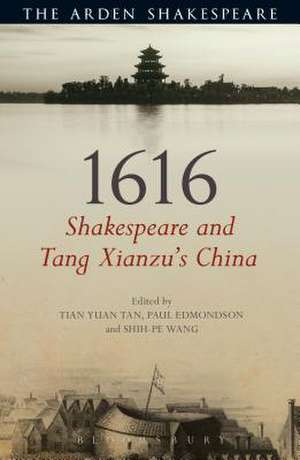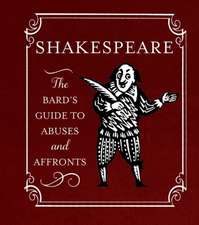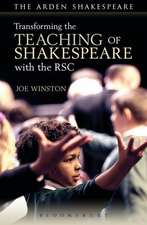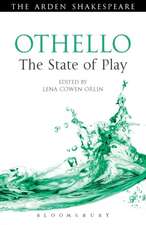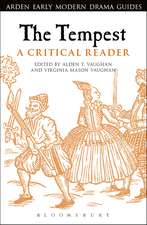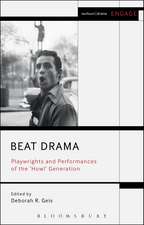1616: Shakespeare and Tang Xianzu's China
Editat de Tian Yuan Tan, Dr Paul Edmondson, Shih-pe Wangen Limba Engleză Hardback – 24 feb 2016
| Toate formatele și edițiile | Preț | Express |
|---|---|---|
| Paperback (1) | 185.93 lei 3-5 săpt. | |
| Bloomsbury Publishing – 24 feb 2016 | 185.93 lei 3-5 săpt. | |
| Hardback (1) | 714.44 lei 6-8 săpt. | |
| Bloomsbury Publishing – 24 feb 2016 | 714.44 lei 6-8 săpt. |
Preț: 714.44 lei
Preț vechi: 915.31 lei
-22% Nou
Puncte Express: 1072
Preț estimativ în valută:
136.71€ • 148.96$ • 115.20£
136.71€ • 148.96$ • 115.20£
Carte tipărită la comandă
Livrare economică 23 aprilie-07 mai
Preluare comenzi: 021 569.72.76
Specificații
ISBN-13: 9781472583420
ISBN-10: 1472583426
Pagini: 352
Ilustrații: 10 b/w illus
Dimensiuni: 129 x 198 x 21 mm
Greutate: 0.47 kg
Editura: Bloomsbury Publishing
Colecția The Arden Shakespeare
Locul publicării:London, United Kingdom
ISBN-10: 1472583426
Pagini: 352
Ilustrații: 10 b/w illus
Dimensiuni: 129 x 198 x 21 mm
Greutate: 0.47 kg
Editura: Bloomsbury Publishing
Colecția The Arden Shakespeare
Locul publicării:London, United Kingdom
Caracteristici
Essays
by
leading
international
scholars
illuminate
the
work
and
the
theatrical
contexts
in
which
they
were
produced
in
seventeenth-century
England
and
China
Notă biografică
Tian
Yuan
Tanis
Reader
in
Chinese
Studies
at
SOAS,
University
of
London,
UK,
and
the
Secretary-General
of
the
European
Association
for
Chinese
Studies.Paul
Edmondsonis
Head
of
Research
at
The
Shakespeare
Birthplace
Trust
and
Honorary
Fellow
of
The
Shakespeare
Institute,
University
of
Birmingham,
UK.Shih-pe
Wangis
Associate
Professor
of
Chinese
Literature
at
National
Chung
Cheng
University,
Taiwan.
Cuprins
Foreword
by
Wilt
L.
Idema,
Harvard
University
Introduction
by
Tian
Yuan
Tan,
Paul
Edmondson,
Shih-pe
Wang
1)
Setting
the
Scene:
Playwrights
and
Localities-
Yongming
Xu,
'The
Backdrop
of
Regional
Theatre
to
Tang
Xianzu's
Drama'-
Paul
Edmondson,
'Stratford-upon-Avon:
1616'
2)
Classics,
Tastes,
and
Popularity-
Wei
Hua,
'The
"Popular
Turn"in
the
Elite
Theatre
of
the
Ming
after
Tang
Xianzu:
Love,
Dream,
and
Deaths
inThe
Tale
of
the
West
Loft'-
Nick
Walton,
'Blockbusters
and
Popular
Stories'
3)
Making
History-
Ayling
Wang,
'Shishijuas
Public
Forum:The
Crying
Phoenixand
the
Dramatization
of
Current
Political
Affairs
in
Late
Ming
China'
-
Helen
Cooper,
'Dramatizing
the
Tudors'
4)
The
State
and
the
Theatre-
Tian
Yuan
Tan,
'Sixty
Plays
from
the
Ming
Palace,
1615-1618'-
Janet
Clare,
'Licensing
the
King's
Men:
From
Court
Revels
to
Public
Performance'
5)
The
Transmission
of
Dramatic
Texts
and
Printing-
Stephen
H.
West,
'Tired,
Sick,
and
Looking
for
Money:
Zang
Maoxun
in
1616'-
Jason
Scott-Warren,
'Status
Anxiety:
Arguing
about
Plays
and
Print
in
Early
Modern
London'
6)
Dramatic
Authorship
and
Collaboration-
Patricia
Sieber,
'Is
There
a
Playwright
in
This
Text?
The
1610s
and
the
Consolidation
of
Dramatic
Authorship
in
Late
Ming
Print
Culture'-
Peter
Kirwan,
'"May
I
subscribe
a
name?":
Terms
of
Collaboration
in
1616'
7)
Audiences,
Critics,
and
Reception
-
Shih-pe
Wang,
'RevisingPeony
Pavilion:
Audience
Reception
in
Presenting
Tang
Xianzu's
Text'-
Anjna
Chouhan,
'"No
epilogue,
I
pray
you":
Audience
Reception
in
Shakespearian
Theatre'
8)
Music
and
Performance
-
Mei
Sun,
'Seeking
the
Relics
of
Music
and
Performance:
An
Investigation
of
Chinese
Theatrical
Scenes
Published
in
the
Early
Seventeenth
Century
(1606-1616)'-
David
Lindley,
'Music
in
the
English
theatre
of
1616'
9)
Theatre
in
Theory
and
Practice-
Regina
Llamas,
'Xu
Wei'sA
Record
of
Southern
Drama:The
Idea
of
a
Theatre
at
the
Turn
of
Seventeenth-Century
China'-
Will
Tosh,
'Taking
Cover:
1616
and
the
Move
Indoors'
10)
Theatre
across
Genres
and
Cultures-
Xiaoqiao
Ling,
'Elite
Drama
Readership
Staged
in
Vernacular
Fiction:The
Western
WingandThe
Retrieved
History
of
Hailing'-
Kate
McLuskie,
'"There
be
salmons
in
both":
Models
of
Connection
for
Seventeenth-Century
English
and
Chinese
Drama'
Afterword
by
Stanley
Wells,
CBE,
Shakespeare
Birthplace
Trust
Notes
on
Contributors
List
of
Cited
Works
Recenzii
The
sets
of
essays
invite
the
reader
to
make
connections
on
a
common
theme,
including
the
relationship
between
the
state
and
the
theatre,
the
restaging
of
history
in
the
playwrights'
work,
and
audiences'
contemporaneous
reception
of
the
plays.
The
dialogue
created
between
the
essays
illuminates
both
Shakespeare's
and
Tang's
plays
and
their
cultural
contexts
and
offers
a
unique
methodology
that
others
might
follow.1616contributes
to
the
limited
English-language
scholarship
on
Tang
and
Ming
Dynasty
drama
and
approaches
Shakespeare
by
looking
at
one
particular
turning
point.
